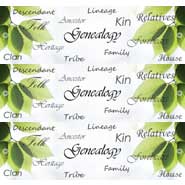Graphic creator: Jenn Vieth
I hear it all too often: Everything necessary for genealogical research is available on the Internet. “Back in the day,” genealogy research involved trips to county courthouses, libraries, and regional archives, and of course writing letters, and letters, and letters, enclosing all those self-addressed stamped envelopes, and then haunting the mailbox, hoping for their arrival.
Now, thousands of genealogical researcher databases, at both free and subscription sites, are available on the Internet. But the idea that all genealogy research can be done from the comfort of your home is simply not accurate, and although I have no crystal ball, I cannot foresee any future in which that will be the case. There will always be a reason for boots on the ground in our ancestors’ neighborhoods. But those boots don’t necessarily have to be on your feet; after all, we all don’t have the luxury of driving from courthouse to courthouse, repository to repository. Others who live in the locales we are researching can help us with our ancestor search, and we can find them in a vastly underutilized resource for the family history researcher — the local genealogical society.
Most of these groups were organized decades ago with the major purpose of preserving local records and providing research assistance for others living far away. Members diligently clipped, sorted, indexed, and filed vital records, obituaries, probate records, and local history items. But with the advent of the Internet, and its unfortunate accompanying mental attitude of It’s all here, many of the treasures these groups assembled have been collecting dust. As family history researchers, we should seek out local genealogical societies to find what they have to offer to help us trace family trees.
A Google search is a good place to start. Try the county name, plus the phrase “Genealogical Society.” If nothing comes up, call the local public library’s reference department, asking if a local genealogical society exists. If so, the library should have contact information. And while you have that reference person on the phone, ask what other relevant genealogical researcher items may be in their collection.
Obviously different societies will have collected and indexed different records. I was thrilled to find the Dodge/Jefferson Counties Genealogical Society in Wisconsin. They maintain a vast clippings file from the early 1850s, not merely of vital records, as valuable as those are, but of the local interest stories, too. Here I found the comings and goings of my 19th Century McMillen family, who were much more mobile than I would have imagined. Trains came through the small town of Fort Atkinson twice a day, bringing visitors from the big city of Milwaukee and the neighboring states of Minnesota and Iowa. These visits, whether for the weekend or several weeks, were reported to the local newspaper. Out-of-town births, marriages, and deaths were called in, as well, and local profiles filled the pages. Here I discovered that my 2nd-great-grandfather Hiram McMillen set out to restore squirrels to the town for the sheer enjoyment of watching their antics (they had been hunted to extinction within Fort Atkinson). I also read of his special Christmas treats for both squirrels and birds — on Christmas Eve, he would tie up nut halves and fill old socks with dried fruit, then go out in the cold Wisconsin night to tie these presents in the trees, and wait for dawn to watch the critters delight in their presents. The Dodge/Jefferson Counties Genealogical Society maintains a master index of articles such as these on their website, available for ordering.
Here in Gallatin County, Montana, the old genealogical society disbanded in 1995 with the rise of the Internet, leaving behind file drawers full of cards and three-ring binders stuffed with newspaper clippings and family group sheets. But their work was available only to people who could come here. Over the decades, past dedicated members assembled a 12,000+ card file of vital records in local newspapers from the 1870s to the 1910s. Because birth, marriage, and death registration was not required, these old papers are the only source for many genealogical events.
Last summer, we reorganized and got this data online. We indexed the index cards, obituary clippings, and additional vital records from the 1970s to the early 1990s. Adding to our predecessors’ work, we indexed local naturalization petitions and divorce records, and resumed the obituaries index. Currently we have started a fifth database, early voter registration records, which contain the voter’s age, city, county, and state of birth, far exceeding census birth information. Indexes for all these databases, more than 27,000 records for our small town, are available worldwide on the Internet through the Gallatin County Genealogical Society website. For a small fee, our members retrieve the actual records for ancestry researchers who request the documents.
As you build your personal family histories and trace family trees, consider where your ancestors lived and what records may be left behind there. Then, search out a local genealogical society to see what rich databases could be waiting there. If you would like assistance in finding these underutilized organizations for your ancestor search, RecordClick offers comprehensive genealogy services to help you with your ancestor search. They, too, have many boots on the ground worldwide.







